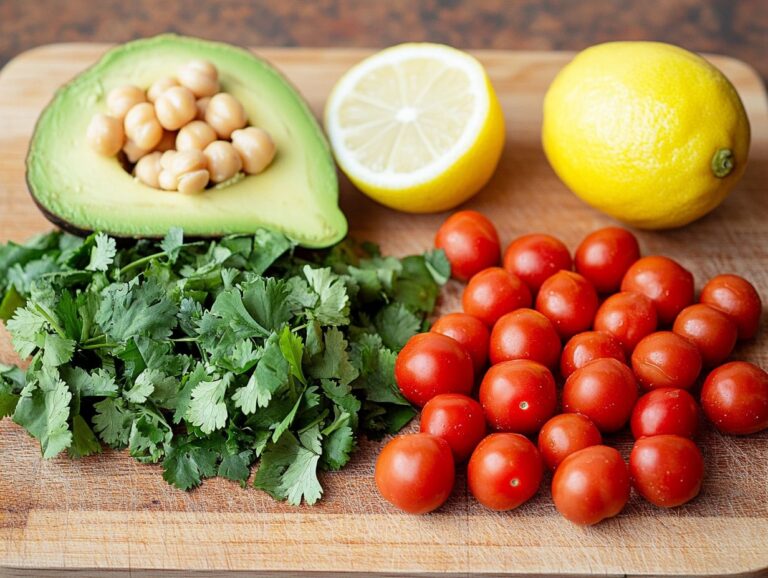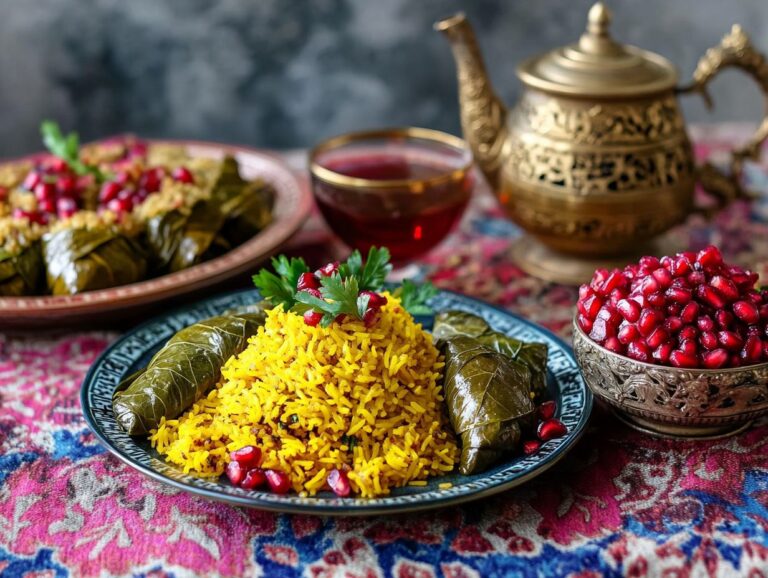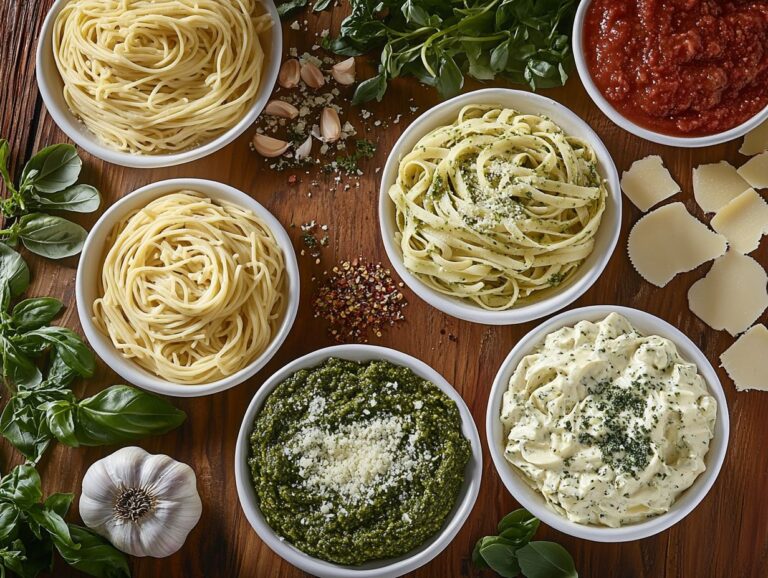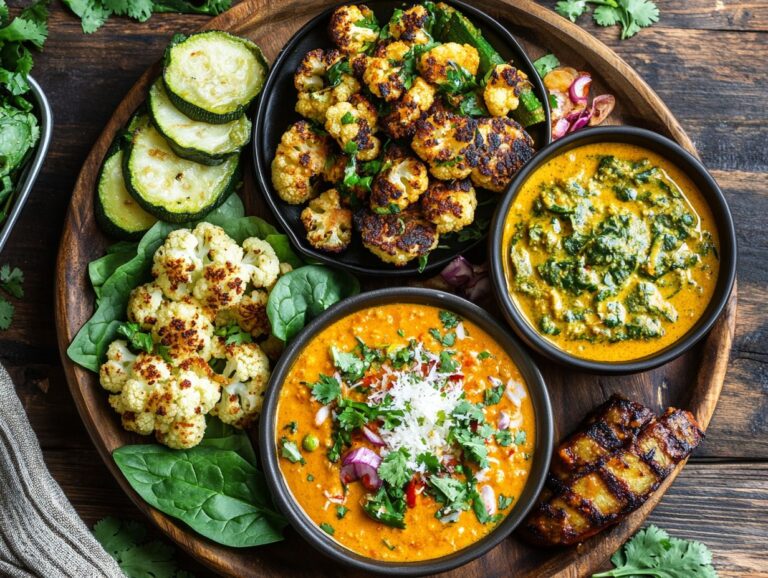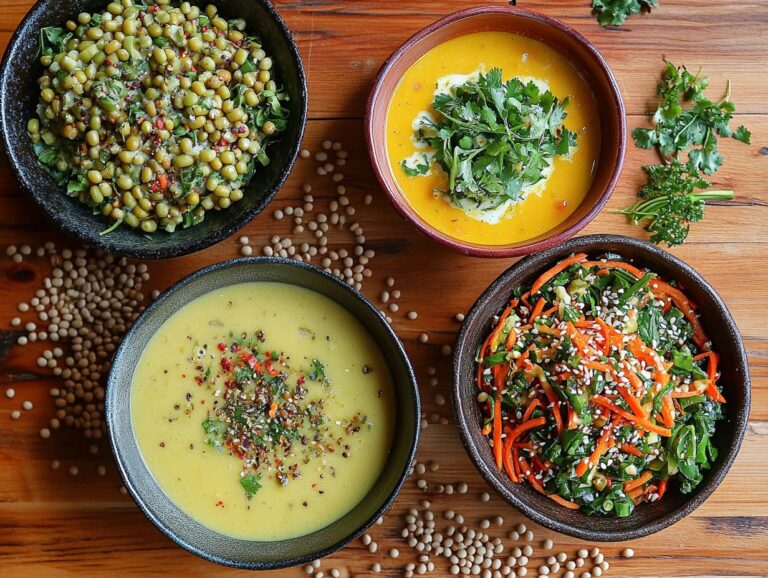South African cuisine is a vibrant tapestry of flavors, shaped by a rich blend of cultures and traditions. This African cuisine is a delightful fusion, showcasing a variety of exotic spices and ingredients. With the growing popularity of plant-based diets, vegan adaptations of traditional South African dishes are becoming increasingly sought after. Vegan recipes often feature healthy and flavorful ingredients like sweet potatoes and chickpeas. This article delves into delectable vegan recipes and African culinary traditions that highlight local ingredients while incorporating global flavors and exotic spices. From savory main courses to delightful desserts, you will find tips, common ingredients, and inspiration drawn from various cultures, ensuring that your vegan South African cooking is both delicious and diverse, with a focus on healthy food choices. Enjoy the journey!
What Makes it Unique?
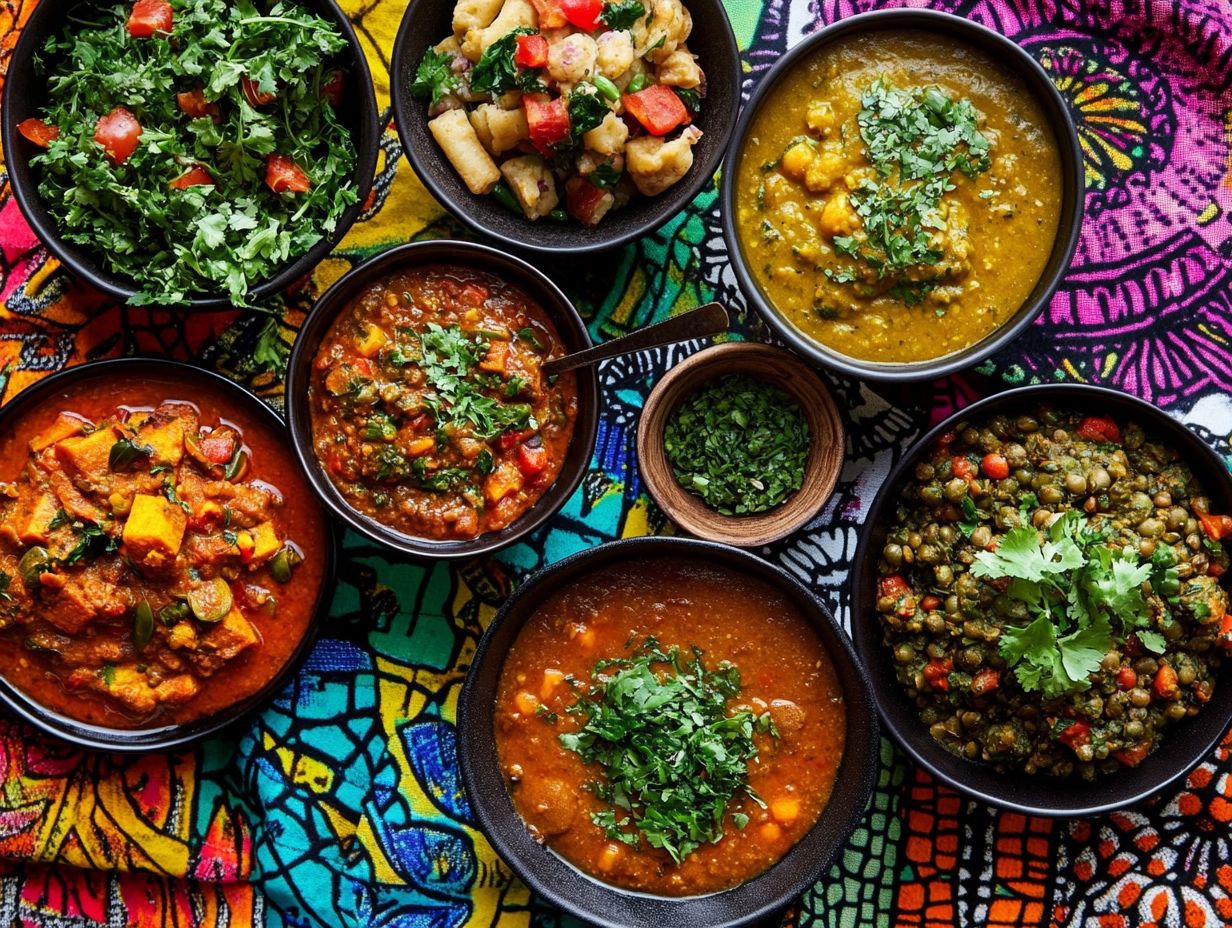 Vegan South African cuisine is celebrated for its bold flavors and diverse spices, showcasing vibrant ingredients that reflect the region’s rich culture. The combination of plant-based foods with traditional cooking techniques results in a wide variety of healthy and delicious options, catering to various dietary needs, including gluten-free and hearty comfort foods, often featuring ingredients like okra and beans. Local staples such as lentils, sweet potatoes, and chickpeas are commonly featured in these dishes, offering both nutrition and rich flavor. Inspired by indigenous cultures as well as Dutch, Indian, and Malay culinary traditions, vegan South African cuisine represents a successful and harmonious fusion, blending diverse spices and creating unique flavors. This can be seen in popular dishes like chakalaka, a spicy vegetable relish, and biltong-inspired mushroom jerky. Such dishes highlight the versatility of traditional ingredients and showcase a rich palette of spices, including peri-peri, coriander, and cumin, often enhanced by the addition of fresh herbs like basil and cilantro. Many chefs in this culinary scene embrace sustainable practices by sourcing ingredients from local farmers, thereby enhancing the farm-to-table movement and honoring regional biodiversity.
Vegan South African cuisine is celebrated for its bold flavors and diverse spices, showcasing vibrant ingredients that reflect the region’s rich culture. The combination of plant-based foods with traditional cooking techniques results in a wide variety of healthy and delicious options, catering to various dietary needs, including gluten-free and hearty comfort foods, often featuring ingredients like okra and beans. Local staples such as lentils, sweet potatoes, and chickpeas are commonly featured in these dishes, offering both nutrition and rich flavor. Inspired by indigenous cultures as well as Dutch, Indian, and Malay culinary traditions, vegan South African cuisine represents a successful and harmonious fusion, blending diverse spices and creating unique flavors. This can be seen in popular dishes like chakalaka, a spicy vegetable relish, and biltong-inspired mushroom jerky. Such dishes highlight the versatility of traditional ingredients and showcase a rich palette of spices, including peri-peri, coriander, and cumin, often enhanced by the addition of fresh herbs like basil and cilantro. Many chefs in this culinary scene embrace sustainable practices by sourcing ingredients from local farmers, thereby enhancing the farm-to-table movement and honoring regional biodiversity.
Traditional Vegan South African Dishes
Traditional vegan South African dishes are both flavorful and diverse, showcasing the region’s rich culinary traditions and cultural influences, with recipes that include savory stews, nutritious salads, and spiced curries. One notable example is vegan Bobotie, a classic South African dish made with spiced lentils or chickpeas, often topped with a creamy, egg-like layer. Other delicious options include savory curries and hearty stews that highlight local vegetables, beans, and spices, ensuring that comfort food is not only nutritious but also satisfying, featuring creamy sauces and exotic flavor profiles.
Popular Plant-Based Recipes
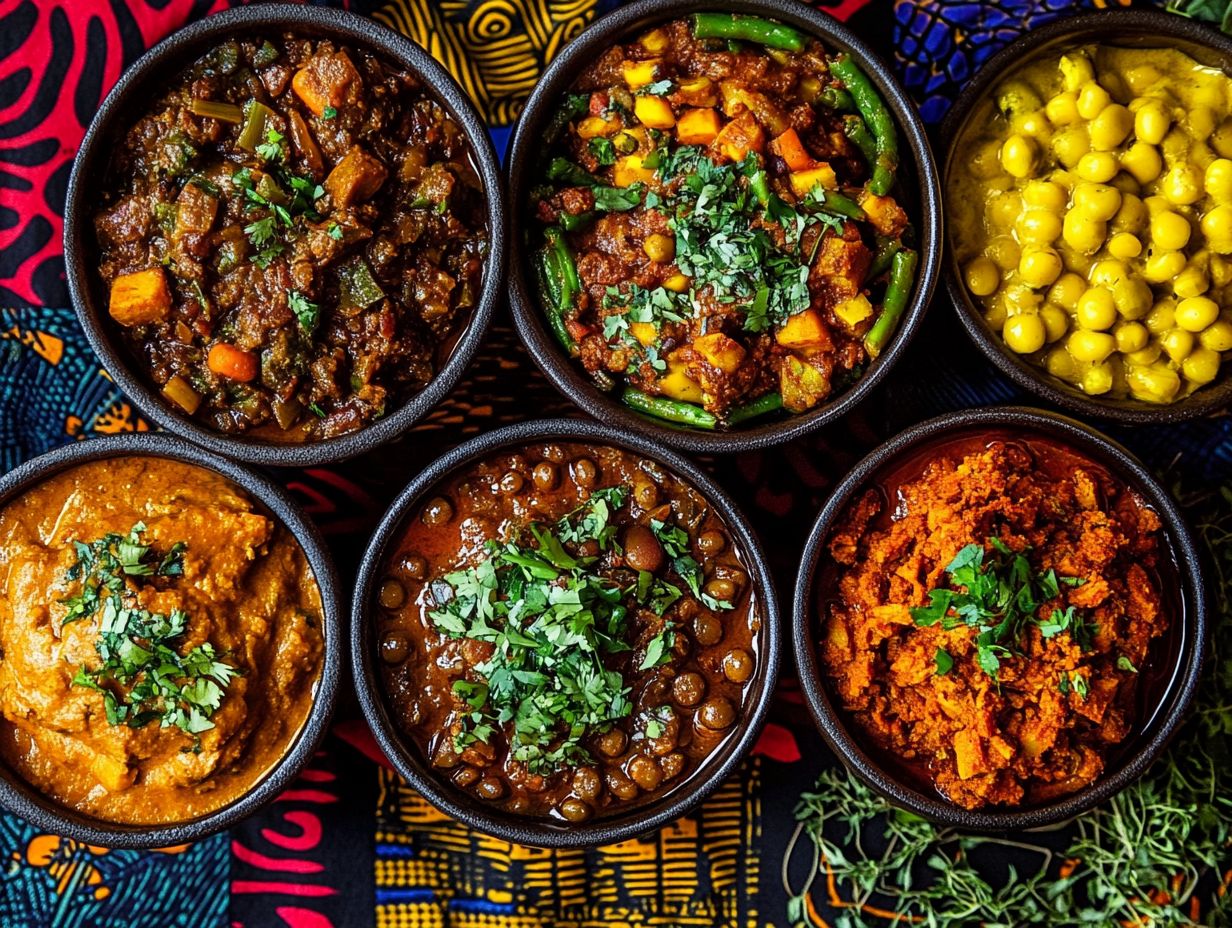 Some popular plant-based recipes from South African vegan cuisine include lentil stew, spiced chickpeas, and kachumbari salad, each offering a unique taste and a vibrant mix of flavors. Kachumbari is a traditional salad made from tomatoes and onions, seasoned with spices. This dish is cherished for its fresh ingredients and is typically served alongside other plant-based options. Lentil stew offers a hearty, warm, and filling meal that can be prepared with various vegetables and enjoyed either as a main dish or as a side. Similarly, chickpeas cooked with spices and vegetables are a nutritious, protein-packed choice that reflects the flavorful spices commonly found in South African cuisine. Seasonal vegetables, such as butternut squash or leafy greens, can often be sourced from local farmers’ markets and incorporated to enhance the flavor and nutritional value of these dishes. Dishes like kachumbari salad pair well with lentil stew or braised vegetables, creating a satisfying meal that is entirely plant-based and environmentally friendly. This combination allows for a comforting and filling dining experience while promoting sustainable eating practices. Fresh herbs, such as coriander and basil, can be added to these recipes to highlight the unique culinary flavors of South African cuisine, bringing out the richness and aroma of each dish. These dishes are ideal for family dinners or gatherings with friends, ensuring everyone enjoys a taste of authentic local fare.
Some popular plant-based recipes from South African vegan cuisine include lentil stew, spiced chickpeas, and kachumbari salad, each offering a unique taste and a vibrant mix of flavors. Kachumbari is a traditional salad made from tomatoes and onions, seasoned with spices. This dish is cherished for its fresh ingredients and is typically served alongside other plant-based options. Lentil stew offers a hearty, warm, and filling meal that can be prepared with various vegetables and enjoyed either as a main dish or as a side. Similarly, chickpeas cooked with spices and vegetables are a nutritious, protein-packed choice that reflects the flavorful spices commonly found in South African cuisine. Seasonal vegetables, such as butternut squash or leafy greens, can often be sourced from local farmers’ markets and incorporated to enhance the flavor and nutritional value of these dishes. Dishes like kachumbari salad pair well with lentil stew or braised vegetables, creating a satisfying meal that is entirely plant-based and environmentally friendly. This combination allows for a comforting and filling dining experience while promoting sustainable eating practices. Fresh herbs, such as coriander and basil, can be added to these recipes to highlight the unique culinary flavors of South African cuisine, bringing out the richness and aroma of each dish. These dishes are ideal for family dinners or gatherings with friends, ensuring everyone enjoys a taste of authentic local fare.
Incorporating Global Flavors into Vegan South African Cooking
Vegan South African cooking with global flavors represents a creative fusion that preserves the traditional tastes and techniques of South African cuisine while broadening the flavor palette and introducing new textures and methods. For example, Misr Wat-style spices can be incorporated into South African lentil stew, and Mediterranean herbs can elevate the flavor of vegetable tagines beyond what is typically achieved with local spices and herbs, creating a delightful fusion of tastes. This combination of global flavors enhances South African dishes, while the traditional elements of South African cooking help to maintain the integrity of the global recipes.
Inspiration from Other Cultures
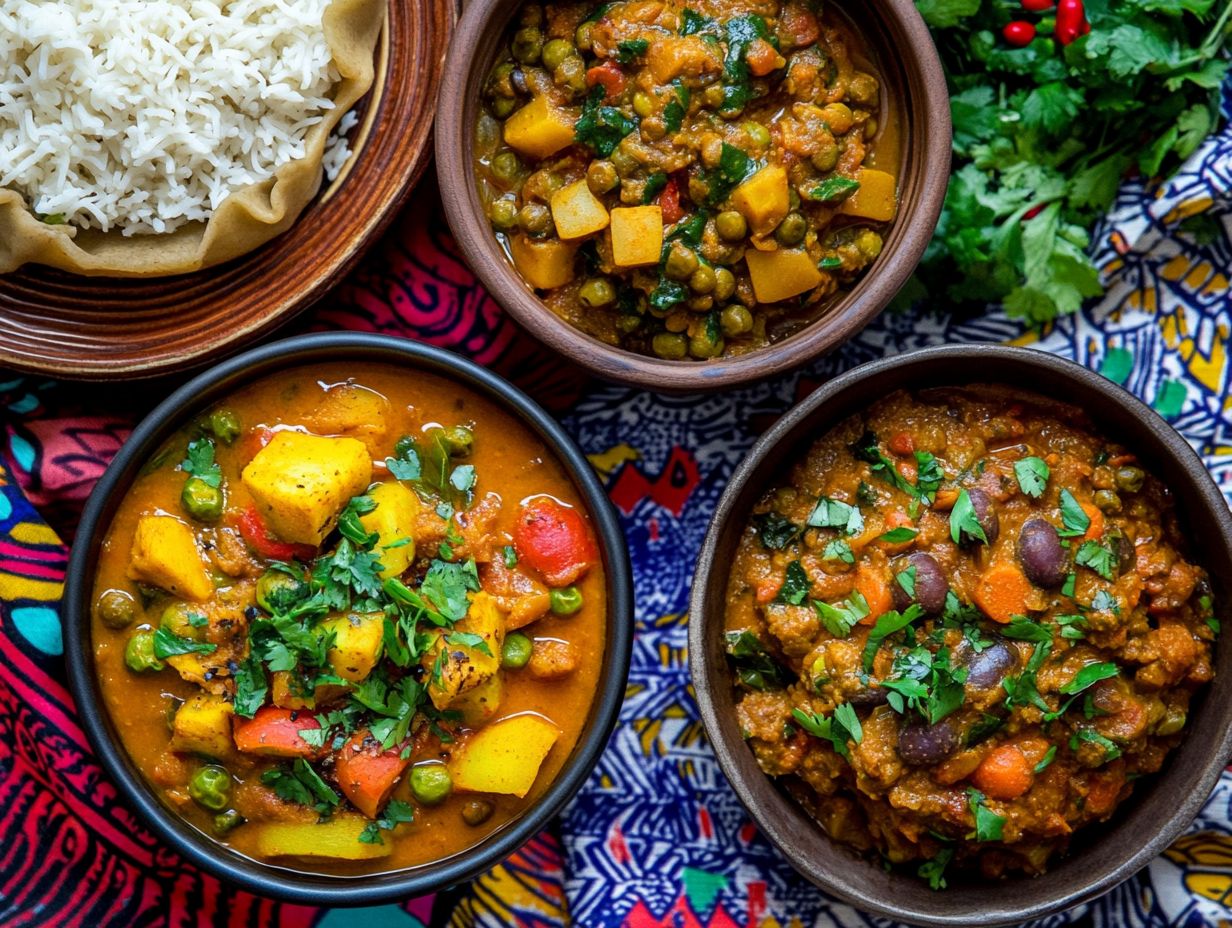 Inspiration from various cultures significantly enhances vegan South African cooking, enabling chefs and home cooks to explore a diverse array of flavors and techniques. For example, Ethiopian collard greens can be adapted into a hearty dish using local leafy greens, while a spicy, Suya-inspired marinade for grilled vegetables adds a unique twist to traditional barbecue fare. Incorporating Chermoula-spiced Karantita can elevate the flavor of chickpea flour dumplings within South African cuisine, adding a spicy and savory dimension to these traditional bites. This fusion not only honors the rich culinary heritage of South Africa but also promotes innovation in vegan dishes. By blending spices and techniques from different traditions such as incorporating Indian curry flavors into vegetable potjies or adding Japanese miso to traditional bean sauces vegan South African cuisine transforms into a vibrant tapestry of tastes, with each dish offering a comforting and unique experience. These adaptations not only expand the palate but also deepen the understanding and appreciation of multicultural influences, fostering a sense of community and shared culinary experiences among people from diverse backgrounds, while also promoting healthy and sustainable eating practices.
Inspiration from various cultures significantly enhances vegan South African cooking, enabling chefs and home cooks to explore a diverse array of flavors and techniques. For example, Ethiopian collard greens can be adapted into a hearty dish using local leafy greens, while a spicy, Suya-inspired marinade for grilled vegetables adds a unique twist to traditional barbecue fare. Incorporating Chermoula-spiced Karantita can elevate the flavor of chickpea flour dumplings within South African cuisine, adding a spicy and savory dimension to these traditional bites. This fusion not only honors the rich culinary heritage of South Africa but also promotes innovation in vegan dishes. By blending spices and techniques from different traditions such as incorporating Indian curry flavors into vegetable potjies or adding Japanese miso to traditional bean sauces vegan South African cuisine transforms into a vibrant tapestry of tastes, with each dish offering a comforting and unique experience. These adaptations not only expand the palate but also deepen the understanding and appreciation of multicultural influences, fostering a sense of community and shared culinary experiences among people from diverse backgrounds, while also promoting healthy and sustainable eating practices.
Vegan South African Ingredients and Substitutions
The versatility and accessibility of vegan South African cooking stem from a wide variety of ingredients and suitable substitutions that accommodate the diverse dietary needs of the population, ensuring that every dish offers a comforting taste while being mindful of health. Common legumes such as chickpeas, lentils, and beans serve as protein-rich bases for traditional South African dishes, while gluten-free grains like oats can be incorporated into hearty stews and breakfast recipes like oat porridge, making these meals filling and nutritious. Additionally, local vegetables and spices contribute the unique flavors characteristic of South African cuisine.
Common Ingredients and Alternatives
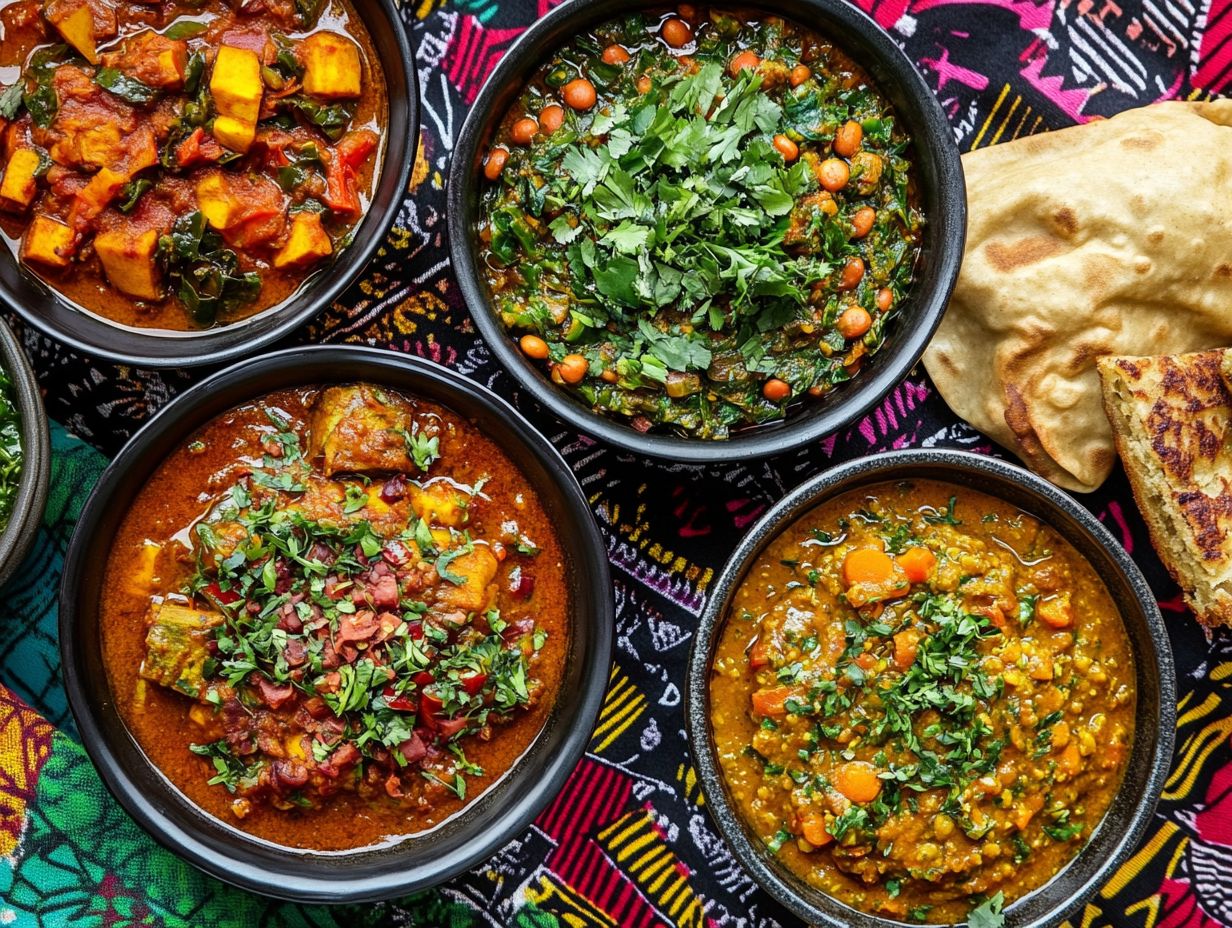 Vegan South African cuisine commonly features a variety of vegetables, spices, and herbs that not only enhance flavor but also boost the nutritional value of dishes. For example, staples such as okra and sweet potatoes are frequently used in many recipes, while spices like curry powder and peanuts enrich both taste and texture. When seeking alternatives, chickpea flour can replace traditional flours to create gluten-free options for classic dishes like dumplings or savory pastries. Legumes, such as lentils and beans, are also essential, providing vital proteins and fiber, making them excellent substitutes for meat. Incorporating these ingredients into recipes like bunny chow or bobotie not only highlights the diversity of flavors but also accommodates various dietary needs. For those who avoid nuts, seeds can be a great alternative, adding texture and nutrition without compromising the traditional essence of the dishes. Additionally, herbs like coriander and parsley elevate the freshness of these meals, showcasing the versatility of vegan South African cooking while ensuring inclusivity.
Vegan South African cuisine commonly features a variety of vegetables, spices, and herbs that not only enhance flavor but also boost the nutritional value of dishes. For example, staples such as okra and sweet potatoes are frequently used in many recipes, while spices like curry powder and peanuts enrich both taste and texture. When seeking alternatives, chickpea flour can replace traditional flours to create gluten-free options for classic dishes like dumplings or savory pastries. Legumes, such as lentils and beans, are also essential, providing vital proteins and fiber, making them excellent substitutes for meat. Incorporating these ingredients into recipes like bunny chow or bobotie not only highlights the diversity of flavors but also accommodates various dietary needs. For those who avoid nuts, seeds can be a great alternative, adding texture and nutrition without compromising the traditional essence of the dishes. Additionally, herbs like coriander and parsley elevate the freshness of these meals, showcasing the versatility of vegan South African cooking while ensuring inclusivity.
Tips for Preparing Delicious Vegan South African Meals
The finest vegan South African dishes are crafted using essential cooking techniques and flavors that define the cuisine and enhance its deliciousness. Key methods such as saut ing, simmering, and slow cooking help to develop the complex flavors typical of South African dishes like stews and tagines. Incorporating fresh herbs and spices is also advantageous, as it elevates the overall quality of the dish. Meals prepared with these techniques not only taste more authentic but are also enjoyed by both vegans and non-vegans alike, making them perfect for gatherings where a variety of dietary preferences are celebrated.
Cooking Techniques and Flavor Combinations
The primary cooking techniques and flavor profiles of traditional South African cuisine can be adapted to create rich and authentic vegan dishes that delight the palate. Cooking methods such as braising and roasting, along with the use of various oils, enhance the natural sweetness of root vegetables like sweet potatoes and butternut squash while intensifying the flavors of essential spices such as cumin and coriander. Marinating ingredients in tangy sauces made from tamarind or lemon juice not only tenderizes them but also infuses them with brightness. A traditional Bobotie can be reimagined using lentils mixed with spices, topped with a custard made from turmeric and plant-based cream. This dish exemplifies how traditional meals can be reinvented without losing their cultural heritage. The boldness of chilies is beautifully balanced by the earthiness of peanuts or sunflower seeds, showcasing the South African flavor that can be creatively interpreted in a vegan context.
Vegan South African Desserts and Snacks
Vegan South African desserts and snacks offer a variety of delicious and healthy options, including traditional sweets like vegan Koeksisters and innovative treats made with pomegranate and fruit purees.
- Mango and Pomegranate Salad with Fresh Lime Dressing This refreshing salad is sweetened with ripe mango and pomegranate, incorporating the rich flavors of African cuisine with a unique dressing.
- Spiced Roasted Nuts A popular vegan snack, these roasted nuts are enhanced with the delicious flavors and aromas of nutmeg, cinnamon, and ginger, embodying the spicy and exotic nature of African spices.
- Baked Chickpea Snacks Chickpeas are a traditional South African snack that is both nutritious and versatile. These simple baked chickpea snacks are spicy and crunchy, making them a perfect fusion of healthy ingredients and culinary traditions.
- Vegan Malva Pudding This traditional South African dessert is moist and spongy, made with brown sugar, fruit jam, and vinegar, which gives it a unique flavor.
These unique and delightful vegan South African desserts and snacks showcase the versatility of local ingredients and the innovative spirit of vegan culinary practices, reflecting both traditional and contemporary African recipes.
Sweet and Savory Treats
Vegan South African cuisine offers a delightful array of sweet and savory treats, including traditional desserts like Koeksisters and sweet potato pudding, as well as savory dishes such as Samosas and Biryani. These dishes balance indulgent flavors with the health benefits of plant-based ingredients, often incorporating elements of North African and East African culinary traditions. South African Koeksisters are deep-fried, twisted pastries soaked in sugary syrup, becoming synonymous with celebrations throughout the country. They embody joy and togetherness within the community, enticing the taste buds with their crispy exterior and gooey sweetness that melts in your mouth. Similarly, South African Samosas are filled with a variety of vegetables and aromatic spices, making them a beloved street food and a popular snack among friends and family. These savory pastries symbolize community and the spirit of sharing, embracing both traditional and contemporary flavors. The health benefits of sweet and savory dishes in South African vegan cuisine are often overlooked, yet many of these recipes incorporate nutritious ingredients such as whole grains, vegetables, and legumes like lentils and beans. They promote a balanced diet while prioritizing flavor, ensuring that enjoyment and health go hand in hand, resonating with the essence of African culinary traditions. This video by Lora O Brien delves into the vibrant world of African cuisine, focusing on the incredible array of vegan dishes that highlight the rich flavors and cultural significance of each recipe.
